Jung Pak, SK-Korea Foundation Chair in Korea Studies and Senior Fellow in the Center for East Asia Policy Studies: The Trump administration will probably tout this as a Nobel-worthy effort by President Trump, but the Singapore summit produced little more than frothy statements without substance, with little accountability for Kim Jong-un to cease and dismantle his nuclear weapons program. In the press conference after the summit, Trump could have reinforced the U.S. commitment to our alliances with South Korea and Japan, but instead made gratuitous comments complimenting Kim and touting his trustworthiness, as well as raising the possibility for more give-aways to Kim, such as a visit to the White House. He also criticized U.S.-South Korean military exercises and cast doubt about the future of U.S. troop presence in South Korea. The Trump-Kim meeting started a diplomatic process, but it will be difficult for working-level U.S. officials to build upon North Korean denuclearization on this very shaky and loose foundation. In effect, maximum pressure has morphed into maximum maneuvering space for Kim.
Jonathan Pollack, Nonresident Senior Fellow in the Center for East Asia Policy Studies and the John L. Thornton China Center: The joint statement is a decidedly underwhelming document, consisting largely of generalities and platitudes that Trump quickly tried to oversell. It contained far fewer specifics than most observers expected, and much less than what Secretary of State Mike Pompeo promised. It obligates North Korea to very little. The United States had numerous “asks” of North Korea, and Kim responded with many noes.
By agreeing to meet with Kim Jong-un, President Trump legitimated Kim as a leader. He also offered Kim numerous concessions. Notably, Trump stated that he would suspend upcoming U.S. military exercises with South Korea, characterizing them as “provocative and expensive.” In addition, he unilaterally opened the door to future U.S. troop reductions, without any consultations with his allies or with U.S. military commanders. He also didn’t specify what the quid pro quos might be, if any.
Kim almost certainly returns to North Korea highly gratified by the summit’s results. President Trump claimed that he was also very pleased, and that the outcomes were historic. However, I’m not sure that even he believes his own words.
Evans Revere, Nonresident Senior Fellow in the Center for East Asia Policy Studies: In advance of the summit, I drew up a list of indicators that would allow us to judge whether the summit had been a success. I identified, for instance: narrowing the U.S.-North Korea gap on what denuclearization means, determining immediate steps Pyongyang could take to demonstrate seriousness and sincerity about denuclearization (e.g., an end to its ICBM program or an invitation to the IAEA to visit the Yongbyon facility), and describing an agreed-upon and specific path towards denuclearization. None of the things on my list was mentioned in the summit statement or in President Trump’s press conference.
The summit statement itself was sparse, anodyne, and detail-free. It could just as easily have been drafted and agreed upon by senior officials a month ago, or even in 1994 or 2000. The statement was a collection of vague aspirational goals, the specifics of which must have been omitted because the two sides just could not agree on the details—or even on the definition—of what they were trying to achieve.
Jung Pak: “Maximum pressure has morphed into maximum maneuvering space for Kim.”
The news about the cessation of our conventional, defensive, essential military exercises with South Korea was shocking, and evidently came as a surprise both to the South Korean government and U.S. forces in Korea. That speaks volumes about the degree to which this outcome was coordinated with partners. I suspect that America’s Asian allies are shuddering right now.
Robert Einhorn, Senior Fellow in the Center for 21st Century Security and Intelligence and the Arms Control and Non-Proliferation Initiative: Although the Trump administration tried in recent days and weeks to lower expectations, it was inevitable that the summit would largely be judged by the administration’s declared goal of nailing down North Korea’s commitment to rapid and complete denuclearization. By that standard, the summit clearly fell short, with only a reaffirmation of Pyongyang’s familiar and vague pledge to “work toward” denuclearization. We will see whether the “very good relationship” the president now claims to have with Kim Jong-un will pay off with concrete results as the process unfolds. There is a risk that, by hyping the success of the summit, Trump will give China and others a pretext for relaxing their enforcement of the sanctions needed to motivate North Korea to take meaningful and verifiable steps toward denuclearization.
Ryan Hass, David M. Rubenstein Fellow in the Center for East Asia Policy Studies and the John L. Thornton China Center: In evaluating the outcome of the summit, the big winner was China. China would like to see a reduction in military forces in Northeast Asia and a widening of the gap between the United States and its allies and partners. Beijing is now on track to achieve these objectives at little cost.
North Korea also fared well. Kim Jong-un extracted concrete security pledges from the United States, put a nail in the coffin of the “maximum pressure” campaign, bolstered his legitimacy at home and abroad, and earned an invitation to the White House, all the while evading offering any new commitments on denuclearization, including details such as timelines, definitions, or verification mechanisms for complete, verifiable, irreversible disarmament (CVID). Until recently, U.S. officials had asserted that CVID was the minimum threshold for a deal. Now, no longer.
For the United States, the outcome should be measured by whether it reduces the threat posed to the American homeland and strengthens America’s relative position in Asia. By creating distance between the United States and its allies without (yet) achieving any tangible reduction in the threat from North Korea, this diplomatic process is off to an inauspicious start. Let’s hope Secretary Pompeo and his negotiating team can reorient this process so that it leads to outcomes that improve America’s security and strengthen its standing in Asia going forward.
Ryan Hass: “The big winner was China.”
Richard Nephew, Nonresident Senior Fellow in the Center for 21st Century Security and Intelligence and the Arms Control and Non-Proliferation Initiative: Setting aside the deleterious implications of Trump’s apparent decision to cancel future U.S.-South Korea military exercises due to their “provocative” nature and expense, the summit largely conformed to my expectations. One fear I had in advance of the summit was that Trump and Kim would commit to continue negotiating directly at their level, which would have created real risk of inadvisable U.S. concessions with respect to the technical aspects of the North Korean nuclear program. Consequently, the most important element of the statement that Trump and Kim signed was the delegation to Pompeo and “a relevant high-level DPRK official” to continue the negotiations, ensuring that there will be a reversion to more technical and detailed talks. Any realistic resolution to the DPRK nuclear and missile threat will require complex negotiations about restrictions and dismantlement activity to be undertaken, verification measures, and sanctions relief. This will take time and the process needs political space in both countries. The tasks now, especially in light of the exercises decision and de facto moratorium on new sanctions, are ally reassurance and coordination on the content of the actual agreement to be negotiated.
Katharine Moon, Nonresident Senior Fellow in the Center for East Asia Policy Studies: “Underwhelming” is how I characterize the Singapore summit between Donald Trump and Kim Jong-un. The joint statement lists aspirations and not a single word of substantive commitment by either side. The summit yielded no specific policy or strategy on peacemaking, denuclearization, or an economic development trajectory in North Korea.
Trump made two unilateral statements that are appalling: 1) The United States will cease joint military exercises with long-time ally South Korea; and 2) China is to be thanked for tightening up sanctions on the border, but regarding its laxness in the last few months: “That’s okay.” The president basically collapsed the U.N. and U.S. sanctions regime with that unscripted phrase. He also made a commitment regarding a long-standing alliance practice without having consulted the South Korean government. The Ministry of National Defense in Seoul was blindsided, and stated that they will seek “clarification” from Washington.
He also pulled the rug from under the Pentagon and Secretary of Defense James Mattis, who had repeated even on Monday, the eve of the summit, that the U.S. troop presence and military exercises are not up for negotiations at this point. The U.S. forces in Korea publicly stated that they will proceed as usual, preparing for August joint exercises with South Koreans since there has been no command from the Pentagon brass to discontinue the planned war games. The United States should have demanded the bare minimum of a declaration by Kim to continue his self-imposed moratorium on nuclear and missile tests, but even that was missing.
The best one can hope for now is that Kim personally had a great time in Singapore, marveling at its beauty and high level of economic development enough to motivate him to pursue economic restructuring and stop the hitherto focus on militarized power.
Jonathan Stromseth, Lee Kuan Yew Chair in Southeast Asian Studies and Senior Fellow in the Center for East Asia Policy Studies and the John L. Thornton China Center: Singapore acquitted itself well in hosting the summit between President Trump and North Korean leader Kim Jong-un. The meeting went off without a hitch and Prime Minister Lee Hsien Loong held bilateral talks with both leaders before the summit got underway.
The outcome of the summit is more concerning: It could have long-term security implications, not just for Northeast Asia but for the broader region. That the administration agreed to suspend U.S.-South Korean military exercises, apparently without informing Seoul or getting anything meaningful in return, could erode trust in America’s relations with allies and emerging security partners in Asia. We are in a better place now than several months ago, when we seemed on the brink of war, but the United States could pay a price with regional partners as they assess these outcomes in the context of their own interests and long-term security trends. It is now incumbent on the administration to provide read-outs and messages of reassurance to our friends and allies around the region.
Michael O’Hanlon, Senior Fellow in the Center for 21st Century Security and Intelligence and Director of Research for Foreign Policy: I am a little happier than some of my colleagues with the outcome in Singapore—perhaps because I am still recovering from the anxiety I felt in 2017 over an all-too-real risk of war, and would take even a flawed diplomatic process over that mutual brinkmanship any day. Also, I have written for a year now, sometimes with Bob Einhorn, that the large-scale U.S.-South Korean exercises President Trump has just decided to suspend are not crucial to alliance preparedness (not sure I’d have called them “provocative,” however!). And I don’t see a photo op with an American president as such a huge concession or gift on our part, either. (I’d even be willing to support signing a peace treaty fairly soon.)
Of course, this hopeful viewpoint is only sustainable if North Korea’s behavior improves. The DPRK’s moratorium on testing nuclear weapons and long-range missiles is a start. But they are still enriching uranium and reprocessing plutonium and building bombs, as well as longer-range rockets, as best we can tell. So I share my colleagues’ view that it’s too early to do victory dances in the end-zone over a vague promise of denuclearization. Thus, it is also too early to ease up on sanctions enforcement (and it is way too early to ease up on alliance military capabilities).
The ball is now appropriately passed to Secretary Pompeo. He needs to work towards the crucial goals of getting North Korea to submit a database with its nuclear facilities enumerated, to get international inspectors into North Korea to visit those facilities (and visit suspect sites a bit too), to have those North Korean nuclear facilities stop producing bomb-grade material (and ideally to get missile factories to suspend operations, too), and ultimately to have the centrifuges and other technologies dismantled. Some of the U.N. sanctions can be suspended, then lifted, as we progress along this path.
Only when we see if North Korea will go along with this kind of plan, and begin its verifiable implementation, will we really know how to evaluate what just happened in Singapore.
Tarun Chhabra, Fellow in the Project on International Order and Strategy: After insisting the United States should never accept a “freeze-for-freeze” approach with North Korea, in Singapore President Trump agreed to a slushy one at best: a freeze of joint U.S. and South Korean military exercises in exchange for a continued freeze on North Korean nuclear and missile testing, with no concrete commitments on real denuclearization. (Read Chhabra’s new post on this topic here.)
In the course of his giveaway, Trump also threw in an invitation to Kim Jong-un to visit the White House, blessed the end of “maximum pressure,” and, for good measure, sucker-punched our Asian allies by apparently providing no warning that he might agree to suspend joint military exercises, and hinting at a future withdrawal of U.S. troops.
Kim, having already demonstrated credible nuclear and missile capabilities, conceded nothing beyond Pyongyang’s longstanding, meaningless and mendacious commitment to denuclearization that it has been peddling for two and a half decades.
While President Trump might be correct that his threat to rain “fire and fury” on the Korean Peninsula helped get Kim to the table (and perhaps persuaded Xi to cajole him there), the opportunity to convert that leverage into real denuclearization has been squandered. All while whipsawing our Northeast Asian allies between fears of entrapment and abandonment.
Jeffrey Bader, Senior Fellow in the John L. Thornton China Center: In Singapore, Kim Jong-un achieved, among other things: legitimization of his regime internationally by meeting with and being the object of lavish praise by the president of the United States; an unexpected and long-sought freeze on U.S.-South Korea joint exercises, with the additional virtue of dividing the United States from South Korea and Japan, who were blindsided by the announcement; a suggestion by President Trump that U.S. strategic bombers based in Guam should not conduct exercises in Korea; and a promise of an invitation to the White House. (Read Bader’s full list of achievements, for both sides, here.)
For his part, President Trump achieved, among other things: a significant decrease in the war atmosphere that prevailed in the Korean peninsula over the last year; a halt in North Korean nuclear and missile testing, put in place by the North Koreans months ago primarily as a good-will gesture to South Korean President Moon Jae-in; a bare-bones North Korean reaffirmation of the goal of denuclearization of the Korean Peninsula, with no details, road map, or timetable; and the release, before the Singapore meeting, of three Americans imprisoned by North Korea on trumped-up charges.
In this case, the art of the deal seems to be to give your negotiating partner what he is seeking, and then some, while counting on Secretary Pompeo to produce the results the United States needs in subsequent negotiations. Good luck to Secretary Pompeo.
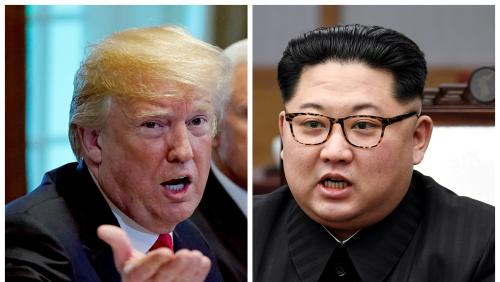
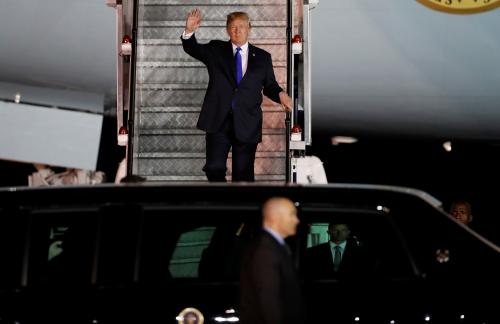
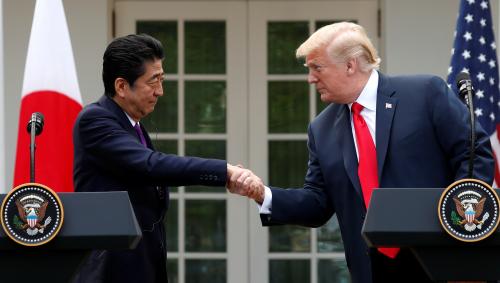











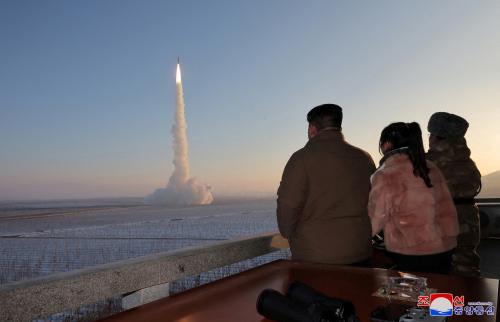
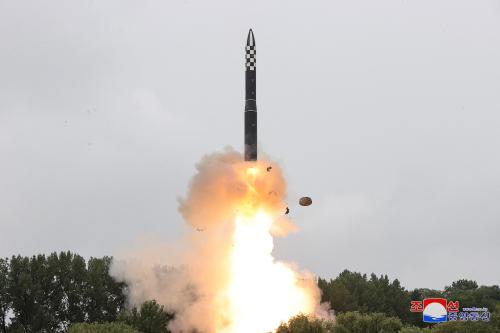
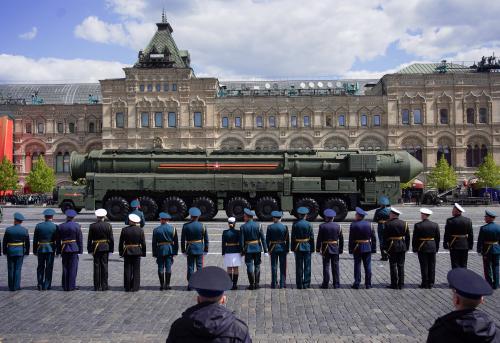
Commentary
Around the halls: Brookings experts react to the Trump-Kim Jong-un summit in Singapore
June 12, 2018